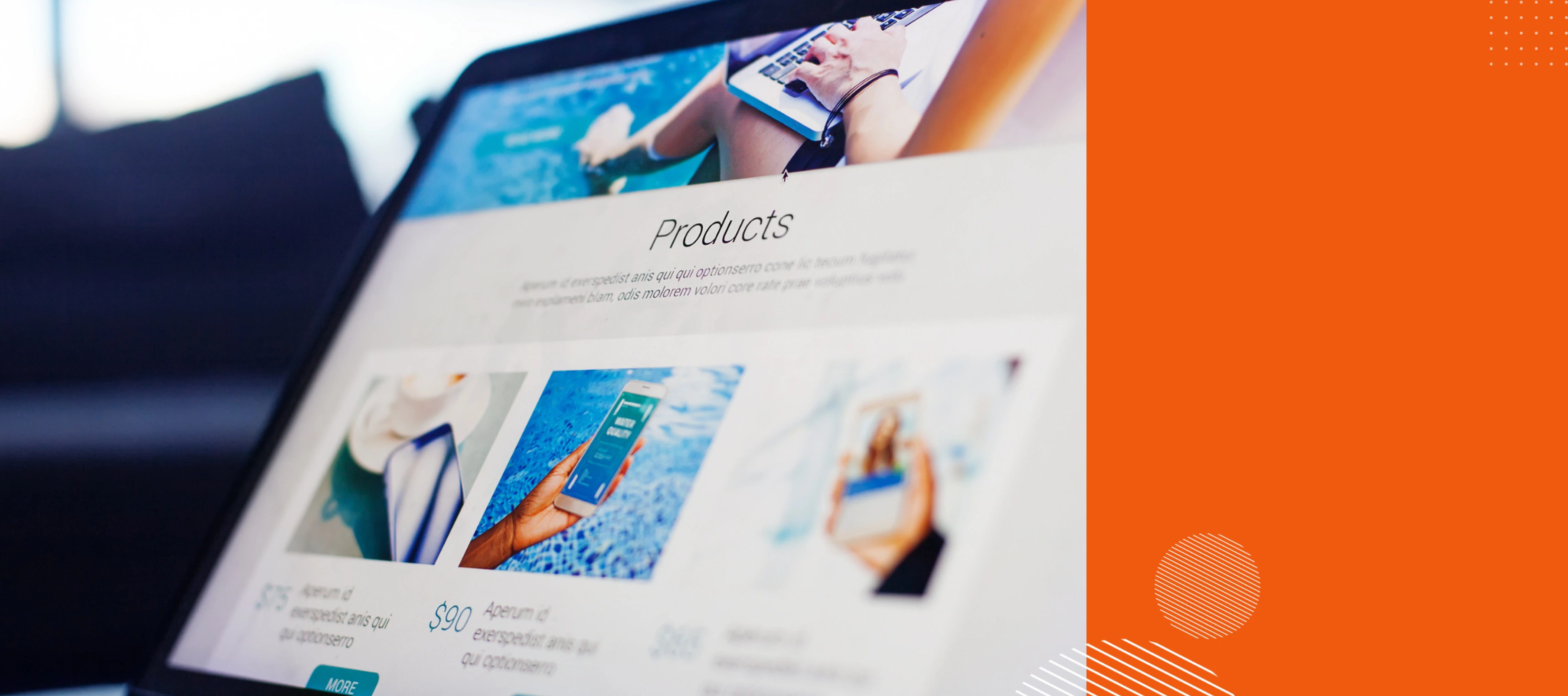FMCG B2B eCommerce and Digitization
Digital channels continue to shake up the FMCG industry. Now is the time to choose the right FMCG B2B eCommerce platform.
Over the past 20 years, the fast-moving consumer goods (FMCG) sector has experienced a remarkable transformation, particularly in regard to adopting online sales channels.
Although significantly boosted by the pandemic, FMCG ecommerce growth finally slowed down in 2021, as consumers and businesses returned to the pre-pandemic behavioral patterns. Nevertheless, ecommerce continues to lead channel growth, even if at a slower pace. Since “digital” is not going anywhere, it’s extremely important to continue developing online channels and respond to new market realities quickly.
To maintain the industry’s stellar ecommerce growth, choosing the right digital solution needs to be a priority.
Looking for a solution for FMCG ecommerce? Don’t have time to read the whole article? We’ve got you covered: Virto Commerce is the optimal solution for FMCG. Virto’s platform is API-first, modular, composable, headless, and cloud-based – everything you need to create an exceptional B2B-first customer experience in an FMCG industry.
In this article, you’ll learn:
- Definitions of B2B and B2C FMCG ecommerce
- Benefits and features of FMCG B2B ecommerce platforms
- Things to look for when choosing an FMCG B2B platform
- Advantages of launching FMCG ecommerce
- Reasons to choose the Virto Commerce platform for your FMCG enterprise
FMCG B2B Industry: Definition, Features, and Top B2B FMCG Companies
Definition of the FMCG industry
The main features of FMCG
The following are the main features of FMCG from both the buyer’s and retailer’s perspectives.
From the buyer’s perspective:
- High availability: FMCG products are typically widely available and sold in multiple shops locally and worldwide.
- Frequent purchases: FMCG products are frequently used. Some products are consumed daily, such as bread and coffee.
- Low effort and engagement: From a consumer’s perspective, FMCG goods are low-effort purchases that do not require deep research or engagement.
- Low prices: Compared to other products, FMCG goods are low-cost and take up only a small portion of the consumers’ income.
- Short shelf life: FMCG products have a short shelf life and are typically perishable.
- Rapid consumption: The time between buying and consuming products is short; some are consumed on the day of purchase.
From the seller’s perspective:
- High volume: High demand requires higher production volume.
- Low contribution margins: Because FMCG goods have high demand and low cost, retailers can sell them at lower prices and retain the same profit margin. Although contribution margins are low, bulk sales ensure overall profitability. Conversely, luxury brands must be sold at a higher price to maintain the desired profit margin.
- Extensive distribution: Because of the high demand and low cost of FMCG goods, they need to be widely available and distributed across several locations.
- High turnover: Since FMCG goods are purchased more frequently, retailers can keep inventory for a shorter time, thereby reducing costs.
B2B FMCG Definition
Top-10 B2B FMCG Companies
Below are 10 top B2B FMCG companies ranked by their market capitalization as of 2022.
- Kweichow Moutai ($2.37T) is a partially state-owned, partially publicly traded Chinese company that specializes in producing and selling Maotai liquor and other beverages, food, and packaging material. The company is also known for IT research and developing anti-counterfeiting technology.
- Johnson & Johnson ($454.19B) is an American multinational company that develops consumer packaged goods, medical devices, and pharmaceuticals. Its common stock is a component of the Dow Jones Industrial Average (DJIA). The company’s credit rating is AAA, higher than that of the US government, making it one of the world’s most valuable and creditworthy organizations.
- Procter & Gamble ($363.01B) is an American multinational consumer goods corporation. The company specializes in a wide range of consumer health, personal care, and hygiene products. Before the sale of Pringles to the brand’s current owner, Kellogg’s, in 2012, P&G’s product portfolio also included food, snacks, and beverages.
- Nestle ($318.67B) is a Swiss multinational FMCG processing conglomerate corporation and has been the world’s largest publicly held food company since 2014. Nestle’s product portfolio includes baby and medical foods, coffee and tea, cereal, confectionery, dairy products, pet foods, snacks, and frozen foods. Nestle is also the main shareholder of L'Oreal, the world’s largest cosmetics company.
- Coca-Cola Company ($274.75B) is an American multinational beverage corporation best known for its iconic Coca-Cola drink. Besides the bestselling sugary drink, Coca-Cola also sells other non-alcoholic and alcoholic beverages. The company’s stock is listed on the NYSE and is part of several indices, such as the DJIA, the S&P 500, and the S&P 100.
- PepsiCo ($242.02B) is an American multinational food and beverage corporation. As of 2022, the company possesses 23 brands in more than 200 countries. PepsiCo's product portfolio includes a wide range of foods and beverages, including iconic brands (such as Pepsi-Cola, Lay's, Doritos, Cheetos, Gatorade, Mountain Dew, etc.) that generate more than $1B each in estimated annual retail sales.
- L’Oreal ($192.93B) is a French personal care company and the world’s largest cosmetics company. L’Oreal’s product portfolio includes hair care, skin care, sun protection, make-up, and perfume products. L’Oreal owns 36 brands and registered 497 patents as of 2021. 23.2% of the company’s shares are owned by Nestle.
- Philip Morris International ($152.95B) is a multinational corporation and one of the world’s leading international tobacco companies. Until a spin-off in March 2008, PM was an operating company of Altria. Although headquartered in New York and listed on the NYSE, PMI doesn’t operate in the USA. Instead, a subsidiary of PMI, Philip Morris USA, owns PM’s brands there. Besides tobacco and cigarette brands, PMI develops and sells less-harmful alternatives to cigarettes.
- Unilever ($101.11B) is a British multinational FMCG company that operates in more than 190 countries. As of 2021, the company’s turnover was $52B, with 58% in emerging markets. Unilever owns more than 400 brands; 13 of those had a turnover of more than $1B in 2021 and are considered among the top 50 global brands. Unilever operates in five business groups such as beauty and wellbeing, consumer care, home care, nutrition, and ice cream.
- Anheuser-Busch InBev SA ($89.24B), aka AB InBev, is a Belgian multinational drink and brewing company and the world’s largest brewer. AB InBev has approximately 630 beer brands in 150 countries. AB InBev is a publicly listed company with a primary listing on Euronext Brussels.
Source: Nielsen's Digital Shopping Fundamentals
FMCG B2B eCommerce: Definition, Evaluation Criteria, Must-Have Features
Any business that wants to operate in a digital space needs to have an ecommerce solution. FMCG companies that trade with other businesses, such as distributors, wholesalers, and retailers, need to have a platform that’s specifically built for that purpose. Since B2B scenarios are distinctly different from B2C, a B2C ecommerce platform won’t work for B2B. In this section, we’ll explain the difference between B2B and B2C ecommerce solutions and advise on features and functionality to look for when choosing an FMCG B2B ecommerce platform.
Looking for an FMCG B2B ecommerce platform but short on time? Virto Commerce is the go-to solution for B2B scenarios of any complexity. We provide an API-first, composable cloud platform that has B2B features out of the box and can integrate with any third-party system.
Fig. 1: Brand Value of the Leading FMCG brands worldwide in 2021, Statista
FMCG B2B platform
An FMCG B2B platform is an ecommerce solution that’s specifically designed for the needs of the FMCG industry. A B2B ecommerce platform has the necessary functionality to conduct business online, showcase products and services, accept orders, and process payments. While one part of the platform is available to any visitor, another part is hidden and accessible only to registered customers with sign-in credentials.
How do you choose a B2B platform for the FMCG industry?
The choice of a B2B ecommerce platform can directly influence your ecommerce operations and, consequently, contribute to the success or failure of your digital enterprise.
Although the choice of the platform will greatly depend on your business requirements and budget constraints, there are a few factors to consider when choosing a solution:
- On-premise or cloud: While an on-premise solution is installed at the vendor’s data center, a cloud platform is deployed, hosted, and maintained by the cloud provider.
- Open-source or proprietary: Open-source solutions allow anyone to access, modify, and distribute the source code. You will not have access to a proprietary solution’s code.
- Architecture: Static platforms are not suitable for the fast-changing ecommerce market. Therefore, it’s best to look for an adaptable solution. A few indicators to look for include: composable architecture, microservices, modularity, APIs, and cloud.
- B2B ecommerce functionality: Apart from basic B2B features out of the box, a platform should have the capabilities to support your FMCG business model and adapt to your unique business scenarios.
- Compliance: Not all platforms provide important security protocols or support data protection features (think GDPR) out of the box. So it’s important to see what protocols, features, and modules are available.
- Costs: Budget constraints can significantly affect your options. Try to think long-term and find out what expenses you will incur besides the obvious acquisition costs.
The Most Expensive Problem in B2B Ecommerce
Must-have capabilities of B2B ecommerce platforms for FMCG companies
A good B2B ecommerce platform needs to have the following capabilities:
- Corporate account management: A B2B ecommerce platform should be able to handle complex corporate account structures. Account management options should be built into the admin console so users can appropriately self-serve and configure/customize their accounts to reflect rules and procedures (such as purchasing) established within their organizations.
- Access and permission management: Because business users have different degrees of accountability, access to information must be restricted and provided on a need-to-know basis. A B2B ecommerce platform must have a built-in mechanism for granting/revoking access to users depending on their job function.
- Catalog management: A B2B ecommerce platform needs to have capabilities for catalog personalization so that users are shown prices and products/items that have been agreed upon in their contracts.
- B2B-specific order management capabilities: B2B order management significantly differs from B2C. For example, B2B buyers often order in bulk and on behalf of their organizations. An ecommerce solution needs to have appropriate tools for managers to request a quote, assemble their orders quickly, reorder quickly, and so on.
- Pricing management: Pricing complexity in B2B depends on multiple factors, such as volume, discount, frequency, and so on. B2B platforms need to account for such complexity and electronically reflect contractually agreed-on terms and conditions.
- Customizable workflows: A B2B platform needs to support custom workflows for both seller- and buyer-related processes.
- B2B-specific marketing and merchandising capabilities: Personalized, relevant content is a formula for success in a digital market. In B2B, personalization doesn’t end with contractual pricing and catalogs but also includes dynamic content and customized recommendations like bundling products or substitutes if a product is unavailable.
- Localization options: For an FMCG company that operates across several regions, website localization is a must. Localization in B2B implies the availability of diverse tools to manage multiple business units with varying requirements, such as different tax regulations and currency conversion.
- Payment and billing options: While a typical B2C website offers many different payment methods, only a few B2B companies are taking advantage of modern digital payments. A B2B platform needs to be able to smoothly integrate with different payment providers to ensure customers can choose their preferred payment mechanism. Besides standard options like purchase orders and credit/debit cards, some other payment options include ACH, COD, BNPL, net 30/45/60, mobile wallets, and trade finance options.
Key Benefits of Launching B2B eCommerce for the FMCG Industry
eCommerce provides many opportunities for both businesses and customers, such as a seamless purchasing experience for buyers and increased branch reach for sellers. For FMCG companies, in particular, ecommerce provides a degree of independence. For example, brands can unlock new revenue streams, expand current market coverage, and reach new regions previously unavailable due to budget constraints or other restrictions associated with traditional expansion. Below, we’ll look at a few other benefits that ecommerce brings to FMCG companies.
- Data collection: If we have to name one reason you should go for ecommerce, it’s definitely the opportunity to collect data about your customers. Data gives you valuable insights into products that are sold more frequently, purchasing trends, buyer profiles, and direct feedback from customers that you can later use to develop and test new products and merchandising opportunities.
- Personalization: B2B upselling and cross-selling are extremely difficult in an offline setting, whereas online personalization and recommendations are done automatically. Personalization in B2B includes showing customers relevant content, including contractually agreed-on prices and products. With a robust recommendation engine, you can offer substitute parts or complementary products that would have been impossible to suggest in a traditional setting.
- Competitive advantage: Fortunately for you, few FMCG companies have already established their digital presence. This provides a unique and early opportunity to get one step ahead of your competitors and differentiate from them by actively engaging in ecommerce. By doing so, you can take center stage while others slowly follow in your footsteps.
- Increased customer retention: Research shows that B2B companies have been competing largely through the quality of customer experience. Since buyer expectations are constantly changing and evolving, digital commerce has become an important medium for both expanding the customer base and retaining existing customers. With a robust ecommerce portal, FMCG companies can provide accurate information about their products and services, such as real-time inventory, and offer self-service options and after-sales support.
- Promotion and merchandising opportunities: To dominate an offline space can be extremely costly. Thankfully, with automated personalization and recommendations, your marketing can finally be free from competitor noise. Moreover, digital marketing, such as SEO, provides high returns with minimal costs.
- Independence from intermediaries: While FMCGs rely on third parties for distribution, you can avoid some intermediaries, which could have been impossible in a traditional setting. Getting direct access to retailers, for example, can give you valuable data not only about those companies but also about your end consumer.
Learn more about B2B Online Marketplace
Our FMCG eCommerce Success Stories
Lavazza by Bluespresso and unified B2B & B2C FMCG ecommerce solution
Coffee distributor Lavazza by Bluespresso was searching for a digital platform that would provide a better shopping experience to both B2B and B2C customers, could handle complex data integration, and be significantly more scalable and flexible than the current solution.
Implementation of a new solution was a particular challenge for Lavazza because it had to be linked and integrated with other components in the company’s ecosystem.
Among prospective solutions, Lavazza decided in favor of Virto Commerce because it was the most flexible. Virto was modular, composable, cloud, and API-first, meaning Lavazza could seamlessly integrate the platform with other ecosystem elements and build any other unique features on top of the functionality that was already available out of the box.
The platform that runs on Virto Commerce offers Lavazza everything it was looking for: ecommerce that is fully configurable and integrated into the ecosystem. The solution also provides a superior customer experience: Lavazza customers can now place orders, view their order history, manage order lists, and view invoices from one interface. Among other advantages are customer trends and data analysis, which are now easily accessible for further.
Learn More About Lavazza's Success
De Klok Dranken replatforming journey
De Klok Dranken, a leading FMCG company based in the Netherlands, was looking for a new ecommerce solution because its legacy platform no longer met the company’s needs due to technical limitations and high development costs. De Klok was searching for an ecommerce platform that is future-proof, flexible, scalable, user-friendly, and cost-effective.
One of the main challenges was replatforming from the legacy system while retaining a few existing capabilities that De Klok thought worked well. User experience was one of De Klok’s top priorities: the new platform had to accommodate extensive functionality and be able to meet future market demands.
Virto Commerce was an ideal solution because it was cost-effective, API-driven, modular, headless, and could easily integrate with internal and third-party systems, such as CMS and SAP. Moreover, because of Virto’s adaptability, De Klok was confident that the platform would be able to accommodate new business scenarios and extend its functionality to reflect changing customer demands.
After implementation, De Klok Dranken saw significant improvements in customer satisfaction and customer loyalty. By integrating with ERP and other systems, the website was able to utilize IoT, trends, and big data to substantially improve its personalized content.
Learn More About De Klok Dranken's Success
Reasons to Choose Virto Commerce for FMCG eCommerce
If you’re still not sure why you should choose Virto Commerce rather than other ecommerce solutions, here’s a quick rundown of Virto’s benefits:
- B2B functionality out of the box: Virto Commerce provides all essential B2B ecommerce features out of the box (such as account, order, catalog, and pricing management) and allows superior flexibility to build other features and modules on top of the native solution.
- Transparent and affordable pricing: Compared to competing solutions, Virto Commerce offers a better platform at a lower price. To compare prices and other features of different popular ecommerce solutions, check out the Virto eCommerce Platform product page.
- Freedom of open source: Virto Commerce is an open-source solution, which means you have access to code and can modify it at your convenience to suit your particular needs. You can purchase Virto’s license and expertise for as low as $700 a month. Free trial, testing, and onboarding are all available.
- Fully adaptable: Virto Commerce is one of the few adaptable solutions on the market: it can change and adapt to particular business requirements now and in the future. Virto Commerce is API-powered, modular, composable, headless, and cloud. With Virto’s well-structured atomic architecture, you can assemble your own ecommerce solution using Virto’s .NET platform modules, your existing back end, and best-of-breed third-party applications.
- Integrations: Virto Commerce can seamlessly integrate with any internal and third-party system (CMS, PIM, ERP, etc.)
- Ecosystem: Virto Commerce provides its users with access to a wider ecosystem of apps that would complement the solution, including advanced search, product information management systems, payment processors, back-office systems, and more.
Fig. 2: Change in Consumer Packaged Goods Sales Due to the Coronavirus Pandemic Worldwide in September 2020, by Country, Statista
Conclusion: Best Solution for FMCG B2B eCommerce
It’s obvious that ecommerce provides fantastic growth opportunities for FMCG companies. The time to enter the digital space is now. With the right ecommerce platform, the path to digital excellence becomes easier. Virto Commerce is the platform of choice for well-recognized and successful companies such as HEINEKEN and Lavazza. Virto Commerce can be your solution, too. With Virto’s future-proof extensive B2B functionality, modularity, and composability, you can create seamless customer experiences that truly scale. Contact us now to learn more.
Book Your Discovery Session with Our Digital Experts
FAQ
 Comparing Virto Commerce: Identify Top 9 eCommerce Alternatives in 2024
Comparing Virto Commerce: Identify Top 9 eCommerce Alternatives in 2024








